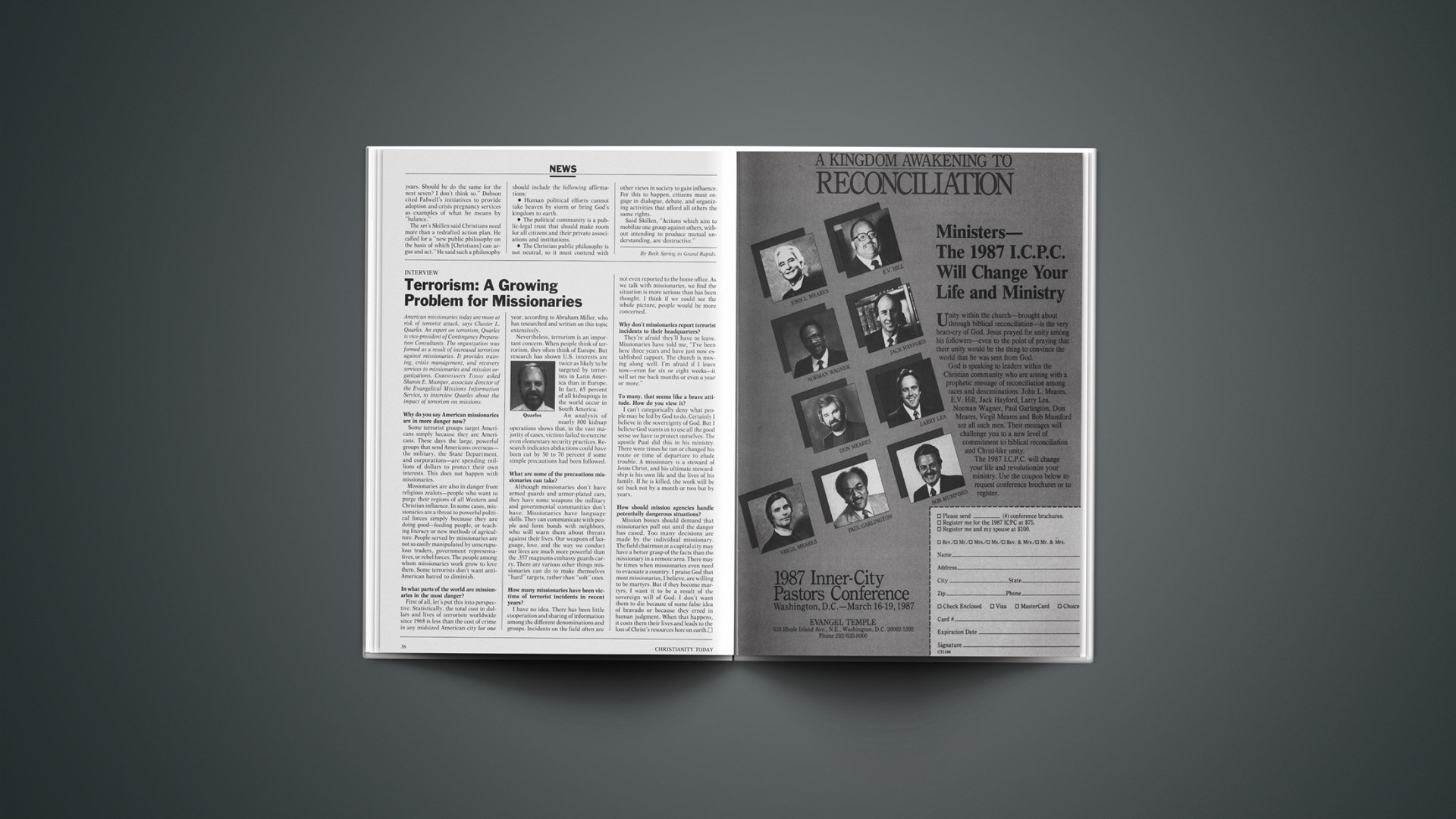American missionaries today are more at risk of terrorist attack, says Chester L. Quarles. An expert on terrorism, Quarles is vice-president of Contingency Preparation Consultants. The organization was formed as a result of increased terrorism against missionaries. It provides training, crisis management, and recovery services to missionaries and mission organizations. CHRISTIANITY TODAY asked Sharon E. Mumper, associate director of the Evangelical Missions Information Service, to interview Quarles about the impact of terrorism on missions.
Why do you say American missionaries are in more danger now?
Some terrorist groups target Americans simply because they are Americans. These days the large, powerful groups that send Americans overseas—the military, the State Department, and corporations—are spending millions of dollars to protect their own interests. This does not happen with missionaries.
Missionaries are also in danger from religious zealots—people who want to purge their regions of all Western and Christian influence. In some cases, missionaries are a threat to powerful political forces simply because they are doing good—feeding people, or teaching literacy or new methods of agriculture. People served by missionaries are not so easily manipulated by unscrupulous traders, government representatives, or rebel forces. The people among whom missionaries work grow to love them. Some terrorists don’t want anti-American hatred to diminish.
In what parts of the world are missionaries in the most danger?
First of all, let’s put this into perspective. Statistically, the total cost in dollars and lives of terrorism worldwide since 1968 is less than the cost of crime in any midsized American city for one year, according to Abraham Miller, who has researched and written on this topic extensively.
Nevertheless, terrorism is an important concern. When people think of terrorism, they often think of Europe. But research has shown U.S. interests are twice as likely to be targeted by terrorists in Latin America than in Europe. In fact, 65 percent of all kidnapings in the world occur in South America.
An analysis of nearly 800 kidnap operations shows that, in the vast majority of cases, victims failed to exercise even elementary security practices. Research indicates abductions could have been cut by 50 to 70 percent if some simple precautions had been followed.
What are some of the precautions missionaries can take?
Although missionaries don’t have armed guards and armor-plated cars, they have some weapons the military and governmental communities don’t have. Missionaries have language skills. They can communicate with people and form bonds with neighbors, who will warn them about threats against their lives. Our weapons of language, love, and the way we conduct our lives are much more powerful than the .357 magnums embassy guards carry. There are various other things missionaries can do to make themselves “hard” targets, rather than “soft” ones.
How many missionaries have been victims of terrorist incidents in recent years?
I have no idea. There has been little cooperation and sharing of information among the different denominations and groups. Incidents on the field often are not even reported to the home office. As we talk with missionaries, we find the situation is more serious than has been thought. I think if we could see the whole picture, people would be more concerned.
Why don’t missionaries report terrorist incidents to their headquarters?
They’re afraid they’ll have to leave. Missionaries have told me, “I’ve been here three years and have just now established rapport. The church is moving along well. I’m afraid if I leave now—even for six or eight weeks—it will set me back months or even a year or more.”
To many, that seems like a brave attitude. How do you view it?
I can’t categorically deny what people may be led by God to do. Certainly I believe in the sovereignty of God. But I believe God wants us to use all the good sense we have to protect ourselves. The apostle Paul did this in his ministry. There were times he ran or changed his route or time of departure to elude trouble. A missionary is a steward of Jesus Christ, and his ultimate stewardship is his own life and the lives of his family. If he is killed, the work will be set back not by a month or two but by years.
How should mission agencies handle potentially dangerous situations?
Mission bosses should demand that missionaries pull out until the danger has eased. Too many decisions are made by the individual missionary. The field chairman at a capital city may have a better grasp of the facts than the missionary in a remote area. There may be times when missionaries even need to evacuate a country. I praise God that most missionaries, I believe, are willing to be martyrs. But if they become martyrs, I want it to be a result of the sovereign will of God. I don’t want them to die because of some false idea of bravado or because they erred in human judgment. When that happens, it costs them their lives and leads to the loss of Christ’s resources here on earth.










